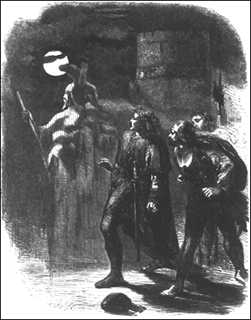![]()
Ghost-lore relevant to Hamlet
 |
Other bits of popular ghost-lore find themselves incorporated in Hamlet. Here are a few examples.
1.) Ghosts will not speak until addressed by some mortal. (Wilson, p. 75)
| BARNARDO. It would be spoke to. MARCELLUS. Question it, Horatio. (I.i.45) |
2.) Scholars come armed with the necessary formulae (presumedly in Latin) for exorcism if the spirit should prove to be an evil one. (Wilson, p. 76)
|
Thou art a scholar. Speak to it, Horatio. (I.i.42) Let's call the butler up, for he speaks Latine, |
3.) Spectres are likely to lead a person to a high spot and there drive him or her mad. (James I. p.63)
| HAMLET.It waves me forth again. I'll follow it. HORATIO. What if it tempt you toward the flood, my lord, Or to the dreadful summit of the cliff That beetles o'er his base into the sea, And there assume some other horrible form Which might deprive your sovereignty of reason And draw you into madness? (I.iv.69-74) |
4.) Persons affected by mania or melancholy are most commonly
subject to receive false imaginations and phantasms. (le Loyer,
p.104)
Father Noel Taillepied presents
further information on this theory. Certainly it is relevant to Hamlet's own
madness.
|
This evil Spirit goeth about seeking whom he may devour, and should he chance to find a man, already of a melancholic and Saturnian humour, who on account of some great losses, or haply because he deems his honour tarnished, the demon here has a fine field to his hand, and he will tempt the poor wretch to depths of misery and depression. --Father Noel Taillepied, A Treatise of Ghosts (1588), trans. Montague Summers, London, Fortune Press [1933], p.95. |
Hamlet, himself, expresses concern that his "melancholy" may make him further susceptible to demonic visitations.
|
The spirit
that I have seen |